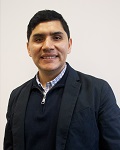2023
Jermani Ojeda-Ludena
- Doctoral Candidate
- University of Texas at Austin

Abstract
The Indigenous Quechuas have exercised their oral rhetoric during their long history in the Andes of South America. With the arrival of radio stations in the 1940s, this rhetoric has spread through the airwaves interrupting the predominance of settler Spanish voices. This broadcasting experience has allowed the resurgence of the indigenous rhetoric to create a sonorous community in the Andes and beyond in times of ongoing colonialism. This puts on the ether indigenous principles such as Rimarinakuy, Uyarinakuy, Willarinakuy, and Napaykunakuy. This innovative project sonically studies Quechua people’s oral rhetoric on broadcasting, and utilizes the “Quechua Radio Praxis” as a methodological, theoretical, and ethical approach based on indigenous knowledge of communication. “The Indigenous Rhetoric’s Resurgence” analyzes Quechua broadcasters’ biographies and their radio programs as the record of their sonorous, communal, and personal lives at the intersection of critical indigenous, indigenous media, voice and sound, and settler colonial studies. Finally, this dissertation includes a collaboratively-built Quechua audio archive.

